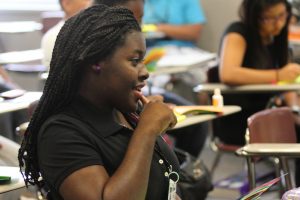
The community and the State Fair of Texas came together to provide 100 percent of seniors at Lincoln High School and Madison High School with the opportunity to complete the Common Black College Application (CBCA) for free.
The CBCA provides specific and targeted access to Historically Black Colleges and Universities (HBCUs) across the nation. The Common Application, while an effective access tool to colleges and universities, is limited in access to HBCUs, which is why this tool is so powerfully unique.
HBCUs are institutions that were created in the 1800s for students of color that could not be admitted to traditional institutions due to segregation laws. While the history of these institutions is reflective of a time in history that was steeped in deep troubles, the development of these institutions became beacons of light and an educational movement.
Theses institutions have become known for admitting and graduating many successful people over the years, including the likes of Oprah Winfrey, amongst other powerful graduates.
HBCUs recruit students from all ethnic backgrounds.
“HBCUs are institutions that provide not only culturally rich learning environments but also focus on academic rigor, which creates academically enhanced growth opportunities,” said Jamila Thomas, a Dallas ISD AASI coordinator. “AASI is excited to share this amazing opportunity with students. While all students may not attend a college or university, all students deserve access to higher education.”




